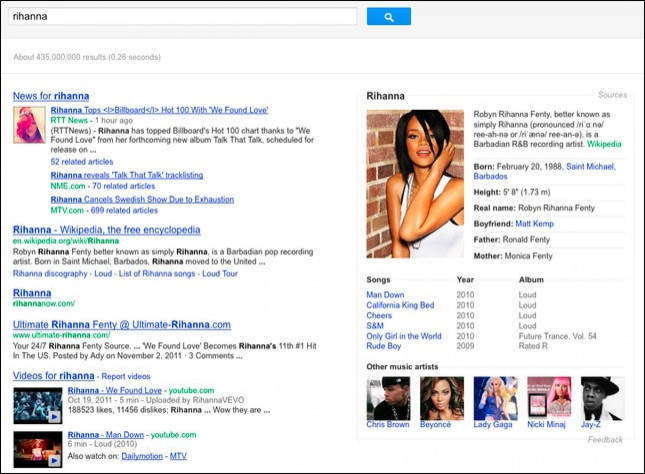Google “Sources”: The Future of Search?
ANALYSIS

Google is testing out a new search product called Sources, which fills Google search results with background information and relevant content based on the query.
The new search feature was reportedly discovered by Cyrus Shepard, a SEO consultant and blogger who stumbled upon Google's new look and took a few screenshots.
It looks like an attempt at filling in the empty space on the right hand side of the screen when no ads appear, he noted.
Shepard tested several different search queries and found the new feature to be hit-or-miss. Google Sources was a hit when Shepard searched for Rihanna, and the Sources page filled up with biographical information from Wikipedia, including her birthdate, family information, current boyfriend, and a list of popular singles and albums by the artist. The bottom of the module even included similar music artists, including Beyonce and Nicki Minaj.
The Sources feature did have a few notable misses. When searching for Twitter, Shepard found a brief description of the company, where it was founded, as well as its current headquarters and CEO. When Shepard clicked on the link, however, he was rerouted to a blog post about Twitter on a site called Frisky Mongoose. Not quite what he was looking for.
Google did not verify the existence of the new Sources feature, besides offering its vanilla explanation of Google is constantly experimenting new features.
Google may not admit Sources exists, but the company has dropped several hints that Sources is on the way. On Nov. 3, Google announced it would begin serving its AdWords at the bottom of the result pages for Google.com, which opens up more space on the right sidebar for Sources content.
Google also announced it was changing its search algorithm to provide more real-time search results and return more relevant results.
Depending on the search terms, the algorithm needs to be able to figure out if a result from a week ago about a TV show is recent, or if a result from a week ago about breaking news is too old, said Amit Singhal, a Google fellow.
Google altered its search algorithms to improve Google News, but in all likelihood, the company was probably trying to beef up the algorithm so Google Sources would return more relevant information about the query, including recent news stories.
Furthermore, Shepard's discovery of Google Sources is the second time in the past few months that users have detected Google experimenting with contextual search results. In August, Google released a similar discovery tool called Google Related, which allowed users to find and access content that's similar to what they were looking at in their Web browser. For example, if a user was looking at Rihanna's biography in Wikipedia, Google Related would pull up Rihanna's music videos, recent news or relevant webpages.
Google Sources looks like a modified version of Google Related, by organizing related links in the search results instead of allowing them to follow you as you surf the Web. It makes sense if Google pulled back the reins on Google Related and reshaped it into Google Sources: users may not want to see related links everywhere they go, but they probably want all of the relevant links they can find in search. Surfing pages is casual, while searching is meant for research; Sources works best for the latter.
If Google can clean up Sources, it may be the knockout punch to search engine competitors like Microsoft's Bing. By providing encyclopedic information in search results, Google could easily become a one-stop shop for background and contextual research, instead of merely an index of relevant Web pages.
© Copyright IBTimes 2024. All rights reserved.






















